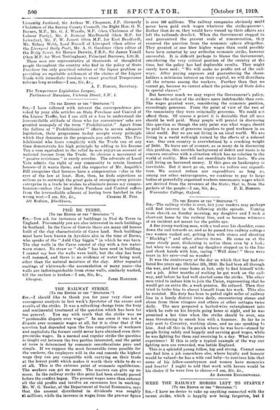[To THE EDITOR OF THE " SPECTATOR."1 SIR,—The railway strike
is over, but your readers may perhaps still find interest in the following strike episode. Coming from church on Sunday morning, my daughter and I took a short-cut home by the railway line, and so became witnesses of an incident not meant for the public eye.
A fine young working man, with a tool over his shoulder, came clown the rail towards us, and as he passed two railway cottages two women rushed out, pelting him with stones and shouting "Blackleg! " and other abusive terms. He came on at the same steady pace, disdaining to notice them even by a look; but when we came up, and my daughter stepped on to the line and shook hands with him, saying " Well done! " there were tears in his eyes—and no wonder !
It was the anniversary of the day on which that boy had enlisted five years ago (October 5th, 1914). He had been all through the war, and had come home at last, only to find himself without a job. After months of waiting he got work on the railway, and before he had well started came the strike. The other men tried to induce him to join the Union, representing that ho would get an extra 15s. a week pension. He refused. Then they tried to bribe him to absent himself from his work. This also he resisted. His duty has been to patrol eight miles of railway line in a lonely district twice daily, encountering stones and abuse from these viragoes and others at other cottages twice daily. The men prepared a barbed-wire entanglement into which he rode on his bicycle going home at night, and he was promised a hot time when the strike should be over, one man threatening to smash him with a hammer. So far he is only sent to Coventry, working alone, and no one speaking to him. And all this in the parish where he was born—stoned by people living safely and happily and earning good wages, while he was fighting for them and receiving is. a day. What a bitter experience! If this is only a typical example of the way our fighting men are rewarded, woe betide England.
This is a splendid young fellow, big and strong. Cannot some one find him a job somewhere else, where loyalty and honesty would be valued—he has a wife and baby—to convince him that some of his fellow-countrymen and women have memories and hearts? I ought to add that work with horses would be his choice if he were free to choose.—I am, Sir, &c.,
AN ASHAMED ENGLISHWOMAN.






































 Previous page
Previous page